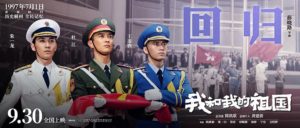My People, My Country
我和我的祖国
China, 2019, colour/b&w, 2.35:1, 154 mins.
Supervising director: Chen Kaige 陈凯歌.
Directors: Chen Kaige 陈凯歌 (VI), Zhang Yibai 张一白 (II), Guan Hu 管虎 (I), Xue Xiaolu 薛晓路 (IV), Xu Zheng 徐峥 (III), Ning Hao 宁浩 (V), Wen Muye 文牧野 (VII).
Rating: 6/10.
The best comes before halftime in this star-studded collection of stories set at key moments in the PRC’s history.
China. I: The Eve 前夜. Beijing, Sep 1949. Amid general nervousness on the eve of the official ceremony on 1 Oct in Tiananmen Square to proclaim the establishment of the PRC, Lin Zhiyuan (Huang Bo), the anal head of the Ceremony Arrangement department, says he still cannot ensure whether the electrically-operated flag-raising equipment will work or not. As he works through the night to meet the inspection deadline of 06:00, a security officer, Du Xinghan (Wang Qianyuan), is assigned to him. II: Passing By 相遇. Lop Nur, Xinjiang province, northwest China, Oct 1964. Gao Yuan (Zhang Yi), a member of the Project 596 team developing China’s first atomic bomb, is seriously injured during one experiment and hospitalised in Beijing. Appreciating his braveness, his chief, Chen Xuelian (Zhang Jiayi), visits him and says he may hear some news on the streets soon. Gao Yuan finally goes for a walk and is accosted on a bus by a young woman, Fang Min (Ren Suxi), who claims to be his girlfriend whom he hasn’t contacted for three years. III: The Champion 夺冠. Jing’an district, Shanghai, Aug 1984. Led by old Zhang (Zhang Jianya), the neighbours of Chen Dongdong (Han Haolin), whose father (Shao Wen) is a TV engineer, tell the boy to bring his TV into the alley so they can all watch the Women’s Volleyball final between China and the US at the Olympic Games. Chen Dongdong, however, is more interested in whether his schoolmate, Xiaomei (Fan Yujie), who’s emigrating to the US that day with her parents, will manage to turn up. IV: Going Home 回归. Hong Kong, Jun 1997. Six weeks before the Handover at midnight on 30 Jun/1 Jul, preparations for the ceremony are in full force, with special pressure on An Wenbin (Wang Luoyong), Chinese head of protocol, and army officer Zhu Tao (Du Jiang), the main flag-carrier, to ensure the PRC flag is raised at exactly midnight. One of the city’s few remaining watch repairers, Hua (Ren Dahua), whose police inspector wife (Hui Yinghong) is involved in the ceremony, is hired to synchronise a watch. V: Hello Beijing 北京你好. Beijing, Aug 2008. In a company lottery, divorced taxi driver Zhang Beijing (Ge You) wins a ticket to the opening of the Olympic Games. After boasting about it to everyone, he plans to present it to his son (Cheng Yusen) as a surprise gift. But at the last minute he discovers the ticket has been stolen by a young boy (Wang Dong) from Sichuan province he gave a ride to earlier that day. VI: The Guiding Star 白昼流星. Inner Mongolia, Nov 2016. After their father’s death, brothers Wodele (Liu Haoran) and Hazabu (Chen Feiyu) spend some time in prison for juvenile delinquency. Afterwards, old Li, a Han Chinese who’s been there since the Cultural Revolution and runs an agricultural project, takes them under his wing and tries to inspire them to mend their ways. VII: One for All 护航. Sep 2015. Elite fighter pilot Lv Xiaoran (Song Jia) is annoyed at not being allowed to take part in a fly-past by her fellow female pilots to celebrate the 70th anniversary of the end of the Second Sino-Japanese War. Though she’s the best of the group, she’s assigned to a back-up position as an escort. A tomboy all her life, and always trying to prove herself, she selflessly accepts the decision, and during the ceremony makes a major sacrifice for her close colleague Yidan (Tong Liya).
REVIEW
The best comes before halftime in My People, My Country 我和我的祖国, a two-and-a-half-hour collection of seven vignettes set at key dates in the history of modern China. The starriest of a slew of movies celebrating the PRC’s 70th birthday, and often surprisingly entertaining, this one, supervised by veteran directors Chen Kaige 陈凯歌 and Huang Jianxin 黄建新 (the latter as supervising producer), swings between being genuinely inventive and nakedly flag-waving, with the best material often coming from the “smaller” names. After six weeks on release, it’s still in the current Top Ten, with box office nudging RMB3 billion – the only film of its kind to come close to such returns. [Final tally was RMB3.17 billion.]
 The most disappointing segment comes, ironically, from Chen, billed as supervising director of the whole project. Though strikingly shot on the bare plains of Inner Mongolia province, the penultimate episode The Guiding Star 白昼流星 is an un-nuanced “inspirational” tale, set around the 2016 landing of China’s Shenzhou 11 space capsule, about two local delinquents – played by Han Chinese millennials Liu Haoran 刘昊然 (Detective Chinatown 唐人街探案, 2015) and Chen Feiyu 陈飞宇 (who began with a bit in Chen Kaige’s Sacrifice 赵氏孤儿, 2010) – who are put on the straight and narrow by a kindly old agri-farmer. Veteran director Tian Zhuangzhuang 田壮壮 brings a quiet dignity to the latter role but the script by Wen Ning 文宁 (The Monkey King 3 西游记 女儿国, 2018) is weak.
The most disappointing segment comes, ironically, from Chen, billed as supervising director of the whole project. Though strikingly shot on the bare plains of Inner Mongolia province, the penultimate episode The Guiding Star 白昼流星 is an un-nuanced “inspirational” tale, set around the 2016 landing of China’s Shenzhou 11 space capsule, about two local delinquents – played by Han Chinese millennials Liu Haoran 刘昊然 (Detective Chinatown 唐人街探案, 2015) and Chen Feiyu 陈飞宇 (who began with a bit in Chen Kaige’s Sacrifice 赵氏孤儿, 2010) – who are put on the straight and narrow by a kindly old agri-farmer. Veteran director Tian Zhuangzhuang 田壮壮 brings a quiet dignity to the latter role but the script by Wen Ning 文宁 (The Monkey King 3 西游记 女儿国, 2018) is weak.
 The segment is so disappointing as it comes from an experienced hand like Chen; but it still isn’t as bad as the middle episode, Going Home 回归, written and directed by Xue Xiaolu 薛晓路 (Ocean Heaven 海洋天堂, 2010; Finding Mr. Right 北京遇上西雅图, 2013), from whom one doesn’t expect very much at all. Centred on the 1997 Handover ceremony in Hong Kong, it’s a pointless, unfocused story that tries to combine a portrait of an old watch repairer (Ren Dahua 任达华 [Simon Yam]) with the midnight flag-raising event. The whole sloppiness of the segment is summed up by casting an actor with an Australian accent as the UK negotiator, and is made to look even worse by coming after the far-superior opening episode, also centred on a flag-raising ceremony.
The segment is so disappointing as it comes from an experienced hand like Chen; but it still isn’t as bad as the middle episode, Going Home 回归, written and directed by Xue Xiaolu 薛晓路 (Ocean Heaven 海洋天堂, 2010; Finding Mr. Right 北京遇上西雅图, 2013), from whom one doesn’t expect very much at all. Centred on the 1997 Handover ceremony in Hong Kong, it’s a pointless, unfocused story that tries to combine a portrait of an old watch repairer (Ren Dahua 任达华 [Simon Yam]) with the midnight flag-raising event. The whole sloppiness of the segment is summed up by casting an actor with an Australian accent as the UK negotiator, and is made to look even worse by coming after the far-superior opening episode, also centred on a flag-raising ceremony.
 Largely on a level with Chen’s segment are the other two in the second half – Hello Beijing 北京你好, directed by the well-known Ning Hao 宁浩, and the closing episode, One for All 护航, by Wen Muye 文牧野 (presumably included because of his hugely successful debut, Dying to Survive 我不是药神, 2018). A comedy abut a taxi driver who wins a ticket to the 2008 Olympics’ opening night, the former is dominated by veteran actor Ge You 葛优, whose full-throttle performance is the film, nothing less; the latter is a compact story about a fighter pilot who makes a grand sacrifice for her BFF during a 2015
Largely on a level with Chen’s segment are the other two in the second half – Hello Beijing 北京你好, directed by the well-known Ning Hao 宁浩, and the closing episode, One for All 护航, by Wen Muye 文牧野 (presumably included because of his hugely successful debut, Dying to Survive 我不是药神, 2018). A comedy abut a taxi driver who wins a ticket to the 2008 Olympics’ opening night, the former is dominated by veteran actor Ge You 葛优, whose full-throttle performance is the film, nothing less; the latter is a compact story about a fighter pilot who makes a grand sacrifice for her BFF during a 2015  celebratory fly-past by their all-female squad. Succinctly directed by Wen, and bristling with sapphic undertones, it’s basically a condensed character study of a tomboy (Song Jia 宋佳, excellent) who’s spent her whole life trying to prove herself against men. In 15 minutes (the shortest in the collection) and lots of brief flashbacks, Wen packs in more character detail than several of the other episodes; but the whole thing feels very insubstantial to end a portmanteau movie of this scale, and for some reason is capped by another fly-past two years later celebrating the 90th anniversary of the PLA.
celebratory fly-past by their all-female squad. Succinctly directed by Wen, and bristling with sapphic undertones, it’s basically a condensed character study of a tomboy (Song Jia 宋佳, excellent) who’s spent her whole life trying to prove herself against men. In 15 minutes (the shortest in the collection) and lots of brief flashbacks, Wen packs in more character detail than several of the other episodes; but the whole thing feels very insubstantial to end a portmanteau movie of this scale, and for some reason is capped by another fly-past two years later celebrating the 90th anniversary of the PLA.
 Nothing in the film’s second half matches up to the three segments that kick things off, all of which look as if the film-makers have really tried to re-think the cliche of an anniversary movie. That’s no truer than in the first segment, The Eve 前夜 – at 30 minutes the longest in the collection – snappily directed by Guan Hu 管虎 and starring his favourite actor Huang Bo 黄渤 as an anally obsessive technician in charge of the electric flag-raising gear for Chairman Mao’s historic declaration in Tiananmen Square on 1 Oct 1949. Based on a real person, who died in 2002 and only joined the Party in 1956, Huang’s role is a typically obsessive creation of the actor, who here gets to play off against hatchet-faced Wang Qianyuan 王千源 in some wonderful, lightly comic sequences as they work through the night to perfect the gear. Sketching a big event through small characters, Guan’s segment, laden with star cameos, is a de facto snapshot of Beijing society at the founding of the PRC, lavishly staged (including a whole Tiananmen set), skilfully played by a seasoned cast and nicely shot, making a substantial opener for the whole film.
Nothing in the film’s second half matches up to the three segments that kick things off, all of which look as if the film-makers have really tried to re-think the cliche of an anniversary movie. That’s no truer than in the first segment, The Eve 前夜 – at 30 minutes the longest in the collection – snappily directed by Guan Hu 管虎 and starring his favourite actor Huang Bo 黄渤 as an anally obsessive technician in charge of the electric flag-raising gear for Chairman Mao’s historic declaration in Tiananmen Square on 1 Oct 1949. Based on a real person, who died in 2002 and only joined the Party in 1956, Huang’s role is a typically obsessive creation of the actor, who here gets to play off against hatchet-faced Wang Qianyuan 王千源 in some wonderful, lightly comic sequences as they work through the night to perfect the gear. Sketching a big event through small characters, Guan’s segment, laden with star cameos, is a de facto snapshot of Beijing society at the founding of the PRC, lavishly staged (including a whole Tiananmen set), skilfully played by a seasoned cast and nicely shot, making a substantial opener for the whole film.
 The third episode, The Champion 夺冠, directed by popular comic Xu Zheng 徐峥 and set in his home city of Shanghai, is also a condensed portrait of an almost vanished society – the city’s back-alley life during summertime, in this case 1984 when China beat the US in women’s volleyball at the Olympics. Deeply nostalgic in a lively way (just see veteran director Zhang Jianya 张建亚 cameoing as a noisy old denizen, for starters), the segment takes a lateral approach to its subject-matter, via a young boy’s infatuation with a cute schoolmate who’s emigrating. Both engaging and inspiring, it doesn’t actually need its modern-day coda with stars Wu Jing 吴京 and Ma Yili 马伊利 but is none the worse for it.
The third episode, The Champion 夺冠, directed by popular comic Xu Zheng 徐峥 and set in his home city of Shanghai, is also a condensed portrait of an almost vanished society – the city’s back-alley life during summertime, in this case 1984 when China beat the US in women’s volleyball at the Olympics. Deeply nostalgic in a lively way (just see veteran director Zhang Jianya 张建亚 cameoing as a noisy old denizen, for starters), the segment takes a lateral approach to its subject-matter, via a young boy’s infatuation with a cute schoolmate who’s emigrating. Both engaging and inspiring, it doesn’t actually need its modern-day coda with stars Wu Jing 吴京 and Ma Yili 马伊利 but is none the worse for it.
 Sitting between the two is the film’s marginally finest segment, Passing By 相遇, an utterly charming and left-field love story directed by Zhang Yibai 张一白 that’s also typical of its creator and with a beautiful script by Zhang Ji 张冀 (a regular collaborator with Hong Kong director Chen Kexin 陈可辛 [Peter Chan]). Centred on a worker in China’s atomic-bomb project in 1964, it’s a tribute to the nameless heroes of any large-scale project, here via a love affair that was overtaken by history. In the film’s main setpiece, set on a Beijing bus, theatre/film actress Ren Suxi 任素汐 (Mr. Donkey 驴得水, 2016; A Cool Fish 无名之辈, 2018) is simply superb, communicating a range of suppressed emotions to the blank-faced worker (Zhang Yi 张译, fine) before history sweeps them apart. It’s a perfectly balanced short story with, again, a disarmingly lateral approach to a watershed moment in history, tenderly scored by Jin Wulin 金武林 and An Wei 安巍 and precision-shot by d.p. Jian Liwei 简立威 (The Missing.. 绑架者, 2017).
Sitting between the two is the film’s marginally finest segment, Passing By 相遇, an utterly charming and left-field love story directed by Zhang Yibai 张一白 that’s also typical of its creator and with a beautiful script by Zhang Ji 张冀 (a regular collaborator with Hong Kong director Chen Kexin 陈可辛 [Peter Chan]). Centred on a worker in China’s atomic-bomb project in 1964, it’s a tribute to the nameless heroes of any large-scale project, here via a love affair that was overtaken by history. In the film’s main setpiece, set on a Beijing bus, theatre/film actress Ren Suxi 任素汐 (Mr. Donkey 驴得水, 2016; A Cool Fish 无名之辈, 2018) is simply superb, communicating a range of suppressed emotions to the blank-faced worker (Zhang Yi 张译, fine) before history sweeps them apart. It’s a perfectly balanced short story with, again, a disarmingly lateral approach to a watershed moment in history, tenderly scored by Jin Wulin 金武林 and An Wei 安巍 and precision-shot by d.p. Jian Liwei 简立威 (The Missing.. 绑架者, 2017).
CREDITS
Presented by Huaxia Film Distribution (CN), Beijing Bona Film Group (CN), Alibaba Pictures (Beijing ) (CN), Huaxia Film (Beijing) (CN), Xianghe Singing Bird Media (CN), Shanghai Dimension Films (CN), Shanghai Such A Good Film (CN), The Seventh Art Pictures (Xiamen) (CN), Beijing Carving Films Cultural Media (CN), Beijing Dirty Monkeys Studios (CN), Beijing Joyleader Culture Communication (CN), Beijing General Meng Pictures (CN).
Script: Guan Hu, Zhang Ke, Ge Rui, Liu Pei (I); Zhang Ji (II); Hua Weilin, He Keke, Bululufu, Xu Zheng (III); Xue Xiaolu (IV); Xu Luyang, Wang Ang, Liu Xiaodan (V); Wen Ning (VI); Han Baishi, Xiu Mengdi (VII). Photography: Gao Weizhe (I); Jian Liwei (II); Liu Yizeng (III); Zhang Wenbao (IV); Cheng Ma Zhiyuan (V); Cao Yu (VI); Wang Boxue (VII). Editing: Tu Yiran (I); Zhou Xinxia (II); Zhou Xiaolin (III); Kuang Zhiliang (IV); Qiao Aiyu (V); Li Dianshi (VI); Wei Yong (VII). Music: Dou Peng (I); Jin Wulin, An Wei (II); A Kun (III); Jin Peida [Peter Kam] (IV); Hao Yun, Song Nan (V); Wang Zhiyi (VI); Huang Chao (VII). Art direction: Zhao Hai (I); Lin Huxiang (II); Gao Ang (III); Ma Guangrong (IV); Shu Xingxia (V); Tu Yi (VI); Li Miao (VII). Styling: Li Zhou (I); Yang Dan (II); Lei Shuyu (III); Wu Lilu [Dora Ng] (IV); Tan Xiaoshi (V); Wang Zhan (VI); Li Miao (VII).
Cast: I: Huang Bo (Lin Zhiyuan), Wang Qianyuan (Du Xinghan), Ou Hao (Liang Changshou), Liang Jing (Lin Zhiyuan’s wife), Tong Dawei (Luo Lang), Jiang Wu (Zhang Zhixiang), Hu Jun (Luo Ruiqing (Public Security head), Xin Baiqing (Zhao Pengfei), Wei Chen (Public Order Squad captain), Geng Le (Fang), Wang Tianchen (bugler); II: Zhang Yi (Gao Yuan), Ren Suxi (Fang Min), Zhang Jiayi (Chen Xuelian), Zhou Dongyu (hospital nurse), Peng Yuchang (enthusiastic street demonstrator), Luo Haiqiong (Liu, hospital doctor), Zhou Yiran (hospital nurse), Guo Cheng (questioner); III: Wu Jing (adult Chen Dongdong), Ma Yili (adult Xiaomei), Xu Zheng (TV presenter), Liu Tao (Xiaomei’s mother), Zhang Jianya (Zhang, raucous old man), Han Haolin (young Chen Dongdong), Fan Yujie (young Xiaomei), Shao Wen (Chen Dongdong’s father), Zhang Zhihua (Zhang’s wife), Xu Yulan (back-alley woman), Chen Jiaji, Niu Ben (back-alley old men), Duan Bowen, Lang Ping (ping-pong trainers); IV: Du Jiang (Zhu Tao, army flag-carrier), Zhu Yilong (Sun Yueqiang, navy flag-carrier), Hui Yinghong [Kara Hui] (Lian, police inspector), Gao Yalin (Cheng Zhiqiang, Mainland military representative), Wang Luoyong (An Wenbin, Mainland handover protocol supervisor), Ren Dahua [Simon Yam] (Hua, watch repairer, Lian’s husband), Wang Daotie (Wang Yinghui, airforce flag-carrier), Gregory Charles Rivers (Hugh Davies, UK handover negotiator), Nathasha Dratinskaia (Maureen Earls, handover ceremony producer); V: Ge You (Zhang Beijing), Gong Beibei (Yuan Rong, Zhang Beijing’s ex-wife), Wang Dong (Sichuan boy), Cheng Yusen (Zhang Xiaojing, Zhang Beijing’s son); Ma Shuliang (taxi-drivers’ company head), Guo Xiaoxiao (taxi driver); VI: Liu Haoran (Wodele, older brother), Chen Feiyu (Hazabu, younger brother), Jiang Shan (Li’s wife), Tian Zhuangzhuang (Li), Yang Genhe (Batu, boys’ uncle), Jing Haipeng (himself, astronaut), Chen Dong (himself, astronaut); VII: Song Jia (Lv Xiaoran), Tong Liya (Yidan, Lv Xiaoran’s colleague), Zhang Zifeng (teenage Lv Xiaoran), Lei Jiayin (Lv Xiaoran’s boyfriend), Han Dongjun (lead male pilot), Tao Hong (Lv Xiaoran’s mother), Wang Yanhui (Lv Xiaoran’s father), Guo Jingfei (high-school teacher), Yuan Wenkang (instructor), Liang Yuan, Song Nanxi (female pilots), Zhang Shengyue, Zhang Yaoyu, Jia Chenfei (male pilots), Ge Yide (junior high-school pupil), Zhang Bochen (instructor); plus: Gan Yunchen (mechanic), Cheng Feng (policeman), Han Xiao (fireman), Li Hanchen (Tan Pingshan), Sun Liang (Ye Jizhuang), Chang Kaining (political commissar), Yu Tianchuan (Liu Bocheng), Zhou Jianhua (Shen Junru).
Release: China, 30 Sep 2019.
